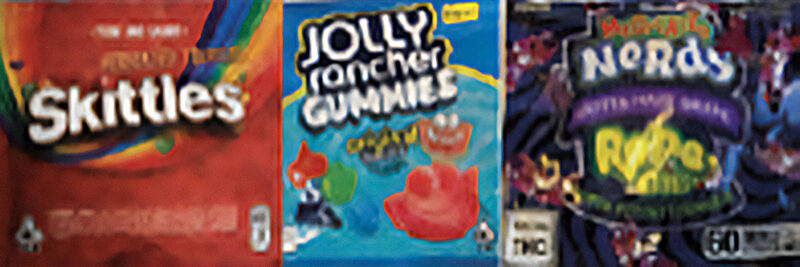In 2019 FSI encountered the first submission of jelly sweets in plastic sachets, which on analysis were found to contain controlled drugs. At the time we couldn’t have anticipated the significance of these innocent looking bags of sweets. In three short years the popularity of these sweets has grown so rapidly that in 2022 work practices and long standing procedures in the drugs section have been amended to better accommodate this growing area of casework.
Cannabis-infused edible products are not a new phenomenon -most people are familiar with ‘hash brownies’ or ‘cannabis cookies’. But while these types of traditional edibles have a more ‘homemade’ feel, the emergence of these jelly sweets has taken on a more professional and commercial appearance, which points to a wider distribution strategy. They are packaged in attractive, eye catching ‘branded’ plastic sachets. In 2022, FSI encountered sachets in casework labelled as Jolly Ranchers, Nerds, Starburst, Skittles and Wowheads to name but a few.

Examples of packaging from jelly sweets submitted to FSI in 2022.
These packages are often labelled as being ‘cannabis infused’ or containing THC (tetrahydrocannabinol), which is the main psychoactive component in cannabis. However upon analysis many of these jelly sweets are not found to contain any THC. FSI has found that more than 50% of the jellies tested in 2022 did not contain THC but instead contained a different type of chemical known as a synthetic cannabinoid. Synthetic cannabinoids are a class of man-made chemicals that are produced to mimic the effects of THC in the body. Little is known about the physiological effects of these man-made compounds and so they pose an even greater risk to product consumers than is realised.
The fact that they are packaged in a way that is so alluring to children is one sinister element to these products, but that they may not contain the drug specified on the packaging is an equally worrying factor that makes these sweets such a danger to society. We had already reported on a case, documented in the media in 2021, where two pre-school children were hospitalised after finding and consuming ‘Chuckles peach ring’ jellies which had been infused with THC. In December 2022 there was further concern when jelly sweets were submitted to FSI that caused adverse reactions and subsequent hospitalisations of three teenagers. This incidence involved ‘Jolly Rancher’ jellies labelled as containing THC, which when tested were found to contain the synthetic cannabinoid ADB-PINACA.
For FSI this area of casework has evolved rapidly and 2022 certainly felt like it had reached a crescendo. Unfortunately this may not be the case, as there are already signs that the product range may be expanding from the jelly sweet style of presentation to a more varied edible product list. In 2022 FSI also saw products submitted for testing like ‘Nutella’ chocolate spread, ‘Wonka’ chocolate bars, ‘Doritos’ crisps and a ‘Fanta’ soft drink, all of which were found to contain THC. It’s notoriously difficult to predict drug marketplace trends but this evolving combination of novel presentations in parallel with the ever expanding list of new synthetic cannabinoids may well indicate further significant drug testing and public health challenges ahead.
